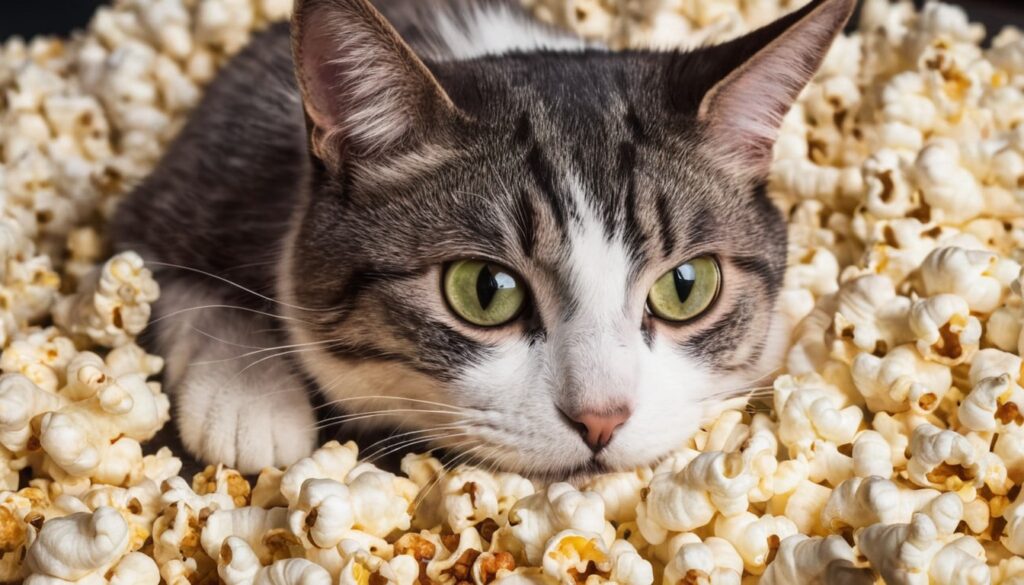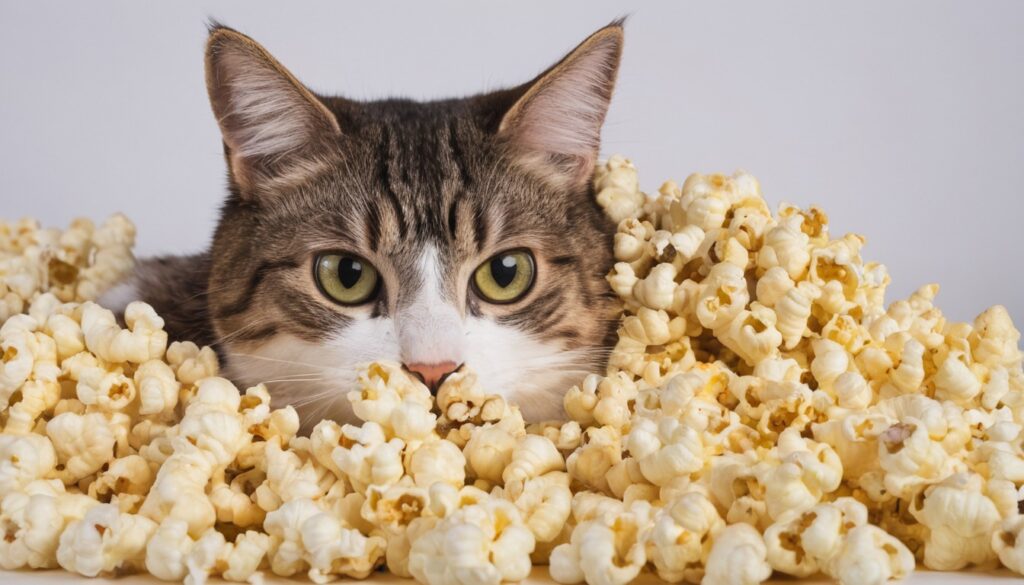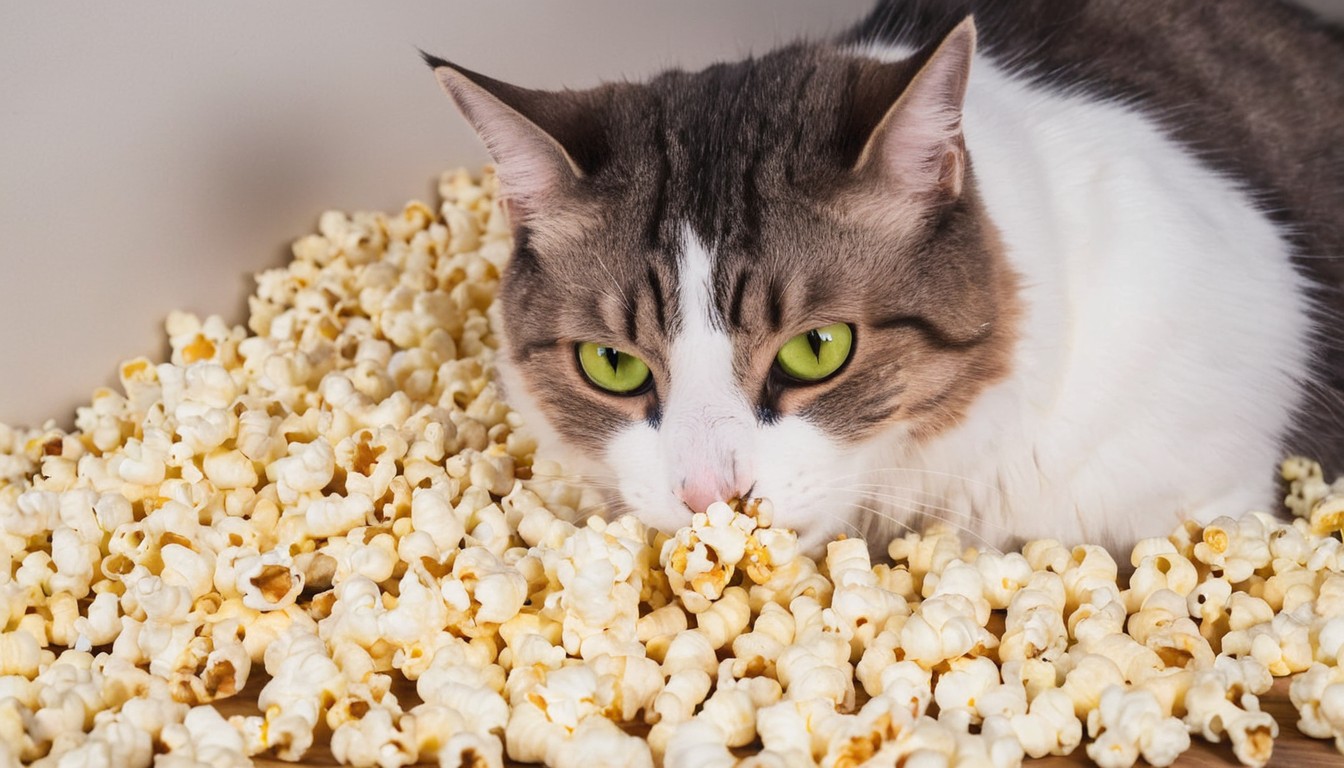Have you ever wondered if your feline companion can join you for a movie night snack of popcorn? Well, before you toss a handful their way, it’s important to consider whether cats can safely indulge in this popular treat.
While cats have a reputation for being picky eaters, their curiosity may lead them to explore new culinary adventures. But is popcorn a safe choice? Is it just a harmless snack or could it pose potential risks to your furry friend?
Let’s dive into the world of cats and popcorn to unravel the truth behind this tantalizing question.
Nutritional Value of Popcorn for Cats
Popcorn may seem like a tempting treat to share with your feline friend, but it’s important to understand the nutritional value of popcorn for cats. While popcorn may be a popular snack for humans, it isn’t an ideal choice for cats. Cats have specific dietary needs, and popcorn doesn’t meet these requirements.
Firstly, popcorn is high in carbohydrates. Cats are obligate carnivores, which means their bodies are designed to primarily consume animal-based protein. Carbohydrates, such as those found in popcorn, aren’t a natural part of their diet and can lead to weight gain and digestive issues.
Secondly, popcorn often contains seasonings and additives that can be harmful to cats. Butter, salt, and other flavorings can upset their stomachs and even be toxic in large quantities. Additionally, unpopped kernels pose a choking hazard and can damage their teeth.
Lastly, cats require a balanced diet that includes essential nutrients like taurine, which is found in meat. Popcorn lacks these crucial nutrients and can lead to deficiencies if it becomes a regular part of their diet.
Potential Risks of Feeding Popcorn to Cats

If you’re considering sharing popcorn with your feline friend, it’s important to be aware of the potential risks involved. While popcorn may seem like a harmless snack, there are a few things to consider before feeding it to your cat.
One of the main risks of feeding popcorn to cats is the possibility of choking. Popcorn kernels can easily get stuck in a cat’s throat or digestive tract, leading to discomfort and potential complications. Cats have smaller mouths and throats compared to humans, making them more prone to choking on small, hard objects like popcorn kernels.
Another risk is the seasoning used on popcorn. Many types of popcorn contain salt, butter, or other flavorings that can be harmful to cats. Excessive salt intake can lead to dehydration and electrolyte imbalances, while butter and other fats can cause digestive upset and lead to weight gain.
Furthermore, popcorn isn’t a nutritionally balanced food for cats. It lacks essential nutrients and doesn’t provide the necessary vitamins and minerals that cats need to thrive. Feeding popcorn as a regular part of your cat’s diet can lead to nutritional deficiencies over time.
Signs of Popcorn Allergy in Cats
Cats can exhibit signs of allergies to popcorn. If your feline friend is allergic, you may notice certain symptoms after they consume or come into contact with popcorn.
One of the most common signs of a popcorn allergy in cats is skin irritation. You may observe redness, itching, or the development of rashes on their skin.
Cats may also experience gastrointestinal issues such as vomiting and diarrhea. These symptoms can occur shortly after your cat consumes popcorn or even a few hours later.
Additionally, cats with popcorn allergies may have respiratory problems. They might start sneezing, coughing, or wheezing. Some cats may also exhibit watery eyes or nasal congestion.
In severe cases, an allergic reaction to popcorn can lead to difficulty breathing, swelling of the face or throat, and even anaphylaxis, which is a life-threatening emergency.
If you suspect that your cat is allergic to popcorn, it’s crucial to avoid feeding it to them and consult with a veterinarian for proper diagnosis and treatment.
Safe Alternatives to Popcorn for Cats
When looking for suitable snacks for your feline friend, there are a variety of safe alternatives to popcorn that you can consider. While cats may be drawn to the smell and crunch of popcorn, it’s important to remember that it isn’t a nutritionally balanced snack for them.
Instead, try these alternatives:
- Plain cooked chicken: Cats are obligate carnivores, meaning they require a diet high in animal protein. Plain cooked chicken is a great option as it provides lean protein without any added seasonings or spices.
- Salmon flakes: Cats love the taste of fish, and salmon flakes can be a healthy and tasty treat for them. Make sure the salmon is cooked and completely boneless to avoid any potential choking hazards.
- Catnip treats: If your cat enjoys the taste of catnip, there are many catnip-infused treats available on the market. These treats provide a safe and enjoyable snack option for your furry friend.
Guidelines for Feeding Popcorn to Cats

Now let’s focus on how to safely feed popcorn to your cat. While popcorn can be a tempting treat, it’s important to follow some guidelines to ensure your cat’s safety and well-being.
First and foremost, make sure the popcorn is plain and unsalted. Flavored popcorn, especially those with additives like butter or cheese, can be harmful to your cat’s digestive system. It’s best to air-pop the popcorn without any oil or seasoning.
Additionally, always remove any unpopped kernels before offering it to your cat, as they can pose a choking hazard. When it comes to portion size, moderation is key. A few pieces of popcorn as an occasional treat should be sufficient. Remember that popcorn should never replace a balanced and nutritious diet specifically formulated for cats.
Lastly, closely monitor your cat after they’ve eaten popcorn. If you notice any signs of discomfort, such as vomiting or diarrhea, discontinue feeding popcorn and consult your veterinarian.
Frequently Asked Questions
Yes, cats can eat plain popcorn but be cautious with flavored popcorn like butter or cheese. These flavors may contain ingredients that are harmful to cats. Stick to plain popcorn as an occasional treat.
Feeding popcorn to kittens may not be safe. It can pose a choking hazard and the butter or cheese flavorings could upset their sensitive stomachs. Stick to a balanced diet for their health.
Yes, cats can eat microwave popcorn, but it’s not recommended. The artificial flavors, high sodium, and butter can be harmful. Stick to cat-friendly treats to ensure their health and well-being.
Feeding popcorn to cats may not provide any significant health benefits. While it can be a tasty treat for them, it is important to remember that their main diet should consist of cat-specific foods.
Feeding popcorn to cats should be done in moderation. While popcorn itself isn’t toxic, it can pose a choking hazard or lead to digestive issues. Consult your vet for specific guidelines.
Conclusion
In conclusion, while cats can technically eat popcorn, it isn’t recommended due to its low nutritional value and potential risks.
Popcorn may cause digestive issues or allergies in some cats. It’s best to stick to cat-friendly snacks and treats that are specifically made for their dietary needs.

